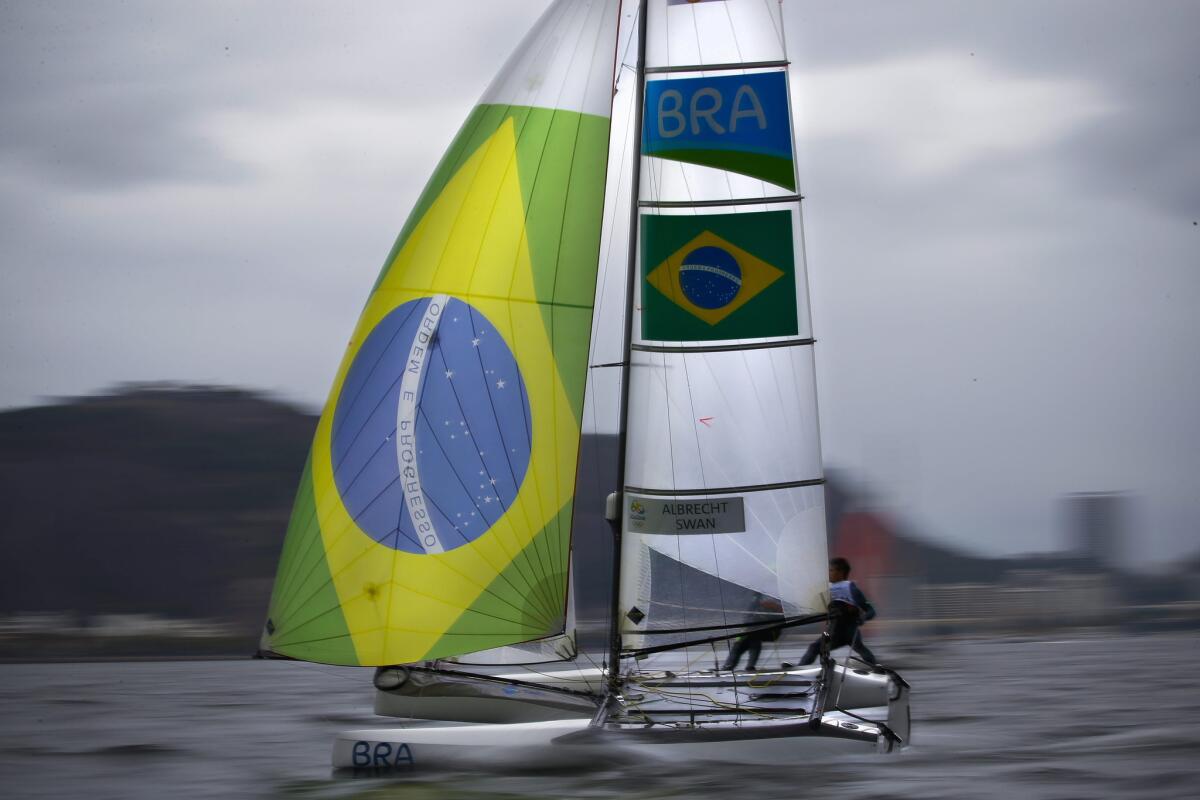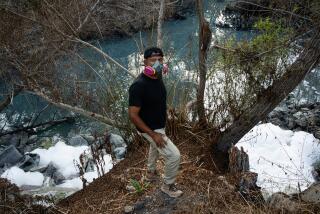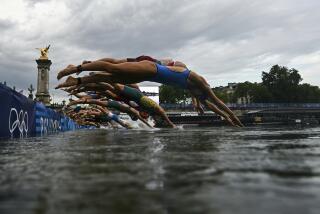Olympians pooh-pooh fears of dirty water in Rio

- Share via
Reporting from Rio de Janeiro — The water, as expected, has ravaged the sailing and rowing competitions at the Rio Games. Only the water in question has fallen from the sky, not muddied up the bay.
Rowing was canceled Wednesday by rain and high winds, the second time in five days the competition has been interrupted by weather. And that doesn’t count what happened on the first day, when two Serbian rowers were dumped into the lagoon after a rogue wave capsized their boat.
Coming into these Games, the dominant story line for the boating and open-water swimming events wasn’t about the quality of the competition but rather the quality of the polluted water. Some predicted that athletes racing through raw sewage were more likely to wind up in a hospital than a medal stand, while others would have to negotiate sofas submerged beneath the waves.
Those fears have gone unrealized.
“I have not seen anyone hit a sofa,” Glenn Merry, CEO of USRowing, said with a laugh Wednesday. “Our guys haven’t reported any IKEA furniture out there.” In fact, his guys haven’t reported anything approaching the apocalyptic conditions that were predicted.
“We prepared for this as we would prepare for any other competition,” he said. “Given how things have played out, we haven’t had any problems.”
And that experience has been the rule, not the exception.
Andrew Lewis, Trinidad & Tobago’s entrant in the men’s Laser event, said he’s competed in Rio five times and said the water pollution has been exaggerated. Other sailors and officials have said the same thing, blaming the media for the controversy.
“Media needs to focus on negative things before the Games start,” said Julien Bahain, a three-time Olympic rower from Canada. “In Beijing it was the [air] pollution. In London, it was all about traffic and unfinished competition sites. And in Rio, mosquitoes are going to be a plague and water is going to get people and athletes sick.
“I haven’t seen a single mosquito. We train and compete on a lake and the water is clean. Tokyo 2020 is around the corner now. What is it going to be about this time?”
More than a year before the Rio Games, the Associated Press commissioned two investigations into the water at Olympic venues and found the presence of disease-causing viruses was 1.7 million times the level of what would be considered hazardous on a Southern California beach.
The source of the contamination is the untreated water dumped into Guanabara Bay, site of the sailing events, and the nearby Rodrigo de Freitas Lagoon, where the canoe and kayak sprint races will be held. A Brazilian TV network said more than 2,100 gallons of sewage pour into the 147-square-mile bay every second, along with 100 tons of garbage per day.
And rain, which fell all day Wednesday in Rio de Janeiro, can make things worse by washing other contaminants into the water. But, many of the rowers and sailors say, the conditions in Brazil aren’t that much different from what they see elsewhere. Consider that Onondaga Lake, a popular rowing site in upstate New York, is also an EPA Superfund site.
“Water quality is not an issue limited to Rio,” Merry said. “It’s a global issue.”
Rio is unique, however, because more than 50 rivers drain into Guanabara Bay, bringing water rich in sewage and garbage collected upstream. And the promises of Games organizers to treat 80% of the sewage that flows into the bay has gone unmet.
So athletes are taking safeguards.
The Canadian rowing federation has ordered its competitors not to touch the water in Rio, which is tough to do when you’re sitting in a boat. The athletes have also been told to avoid touching their face around the water — again, easier said than done — and advised to use a hand sanitizer when shaking hands with anyone at the competition site.
Other rowers have taken hepatitis vaccines and are using mouthwash if they get water in their mouth.
“You try to take all the precautions you can in order to keep the focus on the competition,” said Gevvie Stone, who qualified for the semifinals of the women’s single scull. “It will be important to take water bottles in plastic bags and wash [oar] handles and take showers afterward, just to make sure.”
Added Bahian, the Canadian rower who won a bronze medal in 2008: “I would probably not drink the water straight from the lagoon. But I wouldn’t do it in Lake Michigan or Lake Ontario either.”
Staying out of the water isn’t an option for the marathon swimmers and triathletes, who have been warned — in media reports — that ingesting even small amounts of the water off Copacabana Beach can cause respiratory and stomach illnesses.
The swimmers believe otherwise.
“Our athletes are saying the water is fine,” said Erin Greene, senior media manager for the Swiss-based International Triathlon Union, which has tested the water and found no cause for concern. “Our athletes are quite happy with the water.”
So is Greene, whose staff has been swimming at Copacabana every morning.
“We’re certainly not putting our athletes in anything that we’re not getting in ourselves,” he said.
Staff writer David Wharton contributed to this report.
More to Read
Go beyond the scoreboard
Get the latest on L.A.'s teams in the daily Sports Report newsletter.
You may occasionally receive promotional content from the Los Angeles Times.







